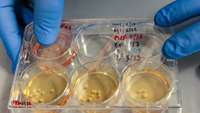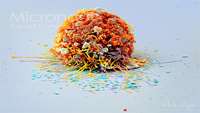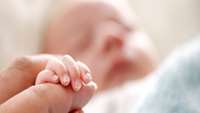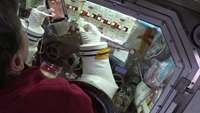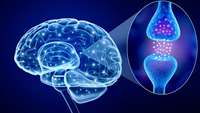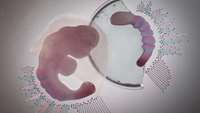Gut microbiome influences ALS outcomes
Harvard University scientists have identified a new gut-brain connection in the neurodegenerative disease amyotrophic lateral sclerosis, or ALS. The researchers found that in mice with a common ALS genetic mutation, changing the gut microbiome using antibiotics or fecal transplants could prevent or improve disease symptoms.
Antidepressant harms developing neurons in lab-grown 'mini-brains'
Researchers at Johns Hopkins Bloomberg School of Public Health have demonstrated the use of stem-cell-derived "mini-brains" to detect harmful side effects of a common drug on the developing brain. Mini-brains are miniature human brain models, developed with human stem cells and barely visible to the human eye, whose cellular mechanisms mimic those of the developing human brain.
Blood vessels communicate with sensory neurons to decide their fate
Researchers at Pompeu Fabra University have shown for the first time that blood vessels communicate with neurons in the peripheral nervous system, regulating their proliferation and differentiation.
Treatment shows promise in treating deadly brain cancer
Researchers of McMaster University and the University of Toronto have developed a promising immunotherapy treatment for a deadly form of adult brain cancer called glioblastoma.
Early clinical trial supports tumor cell-based vaccine for mantle cell lymphoma
A phase I/II clinical trial by researchers at Stanford University suggests that vaccines prepared from a patient's own tumor cells may prevent the incurable blood cancer mantle cell lymphoma (MCL) from returning after treatment.
Cord tissue to treat arthritis is for the dogs
The stem cells in umbilical cord blood and tissue aren’t just for humans; other mammals, such as man’s best friend, may be able to benefit, too.
Treating spina bifida in utero with cord-tissue patch
The scope of the conditions being treated with cord blood and cord tissue stem cells is already extensive and keeps growing. This is a fascinating, current treatment using cryopreserved human umbilical cord to heal spina bifida.
Heart Cells Change During Spaceflight
It sounds scary, but the changes are only temporary: Researchers report that heart cells grown in space showed altered gene expression.
of motor dysfunction in a rat model of Parkinson's disease
Human umbilical cord blood-derived mononuclear cells (hUCB-MNCs) were reported to have neurorestorative capacity for neurological disorders such as stroke and traumatic brain injury.
Scientists develop more accurate stem-cell model of early developing mouse embryo
Scientists from the Hubrecht Institute (KNAW) and the University of Cambridge (UK) have managed to generate complex embryo-like structures from mouse embryonic stem cells. These structures, called gastruloids, can now for the first time grow somites, the blocks of tissue that later develop into the vertebrae and muscles of the embryo



